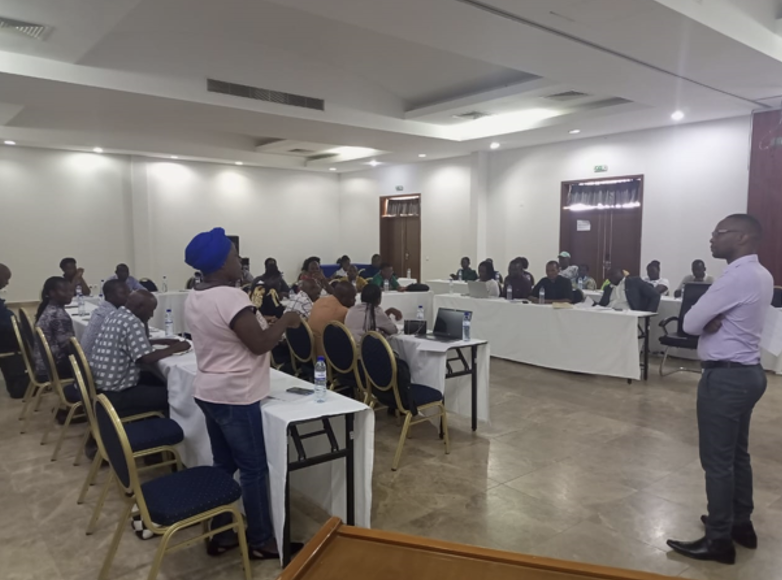Civil Society Organizations and Community Leaders Engage with Local Authority in Tete Province
Events | October 2023
“Towards an Inclusive and Peaceful Society in Mozambique (TIPS)” has established five Provincial Forums composed of civil society organizations and community leaders. The aim of the forums are to provide safe spaces to regularly meet, where members can discuss and seek solutions to issues related to natural resource management, including inclusive and sustainable land management, natural resource-based conflicts, discuss progress on their monitoring plans, and develop joint advocacy plans for inclusive and sustainable management of natural resources. In addition to being a safe space, the Forum will serve as a platform where members will prepare for and agree on the issues to be introduced in the multi-stakeholder platforms.
On 24 October, the provincial forum of Tete organized an event to discuss “The Resettlement Challenges and Conflict Prevention, Conflict Transformation and Advocacy” where 47 participants discussed the challenges with the local authority to find common solutions. The workshop discussed relevant points, highlighting the use of loopholes by corporations in the Decree 31/2012 of 18 August (Decree on Resettlement) in order to exploit natural resources. As an example, the Decree is missing a regulation regarding the distance between an “open sky mine” and local community’s houses to avoid pollution. The mining companies are using this loophold to continue polluting the surrounding environment which then creates health problems for the local communities as well as fueling the conflicts between neighborhood communities and companies. It is identified that there is a need for government intervention to support in enforcing policies for the protection of natural resources and to safegaurd communities.

Community leader sharing experience on conflicts resolutions and dialogue involving corporates, governments and communities.

Group photo.
Another conflicting asepct is the intervention of Community Participation and Consultation Structures, known as Consultative Councils, which was created under Decentralization Program. Communities do not deem this conducive to meeting the local needs as the Consultative Councils structures do not consult with communities during the government planning process. The lack of community engagement in the consultation processes greatly delay’s the government’s initiative to achieve sustainable solutions and benefit the community. This deficiency leads to a misguided prioritization of projects funded by the 2.75% derived from the exploitation of mineral resources. It is imperative that the Consultative Councils should prioritize community engagement and feedback within the planning process. In this sense, the members of the forum demand the change of these members of the Consultative Councils representing the communities or to be trained in planning, dialogue and advocacy skills.
Ms. Lilian, a community leader mentioned among several aspects, that while the TIPS project has enhanced localized capacity building, there is still a lack of openess and compromise by corporates and government in supporting the local community. Conflicts will continue to exist in part because companies violate agreements, even after carrying out dialogue and mediation amongst local communities.
For example, the conflicts in Moatize District are not showing signs of resolving; farmers lost their farms in 2016 and the company VULCAN has yet to make repayments to the farmers. In 2018, homes subsequently collapsed due to poor quality of infrastructure and use of heavy machinery and it was never held responsible. There is a family whose house collapsed in 2018, the family won the case for compensation but still, have not been paid.
Mr. Patricio, Director of Provincial and Environmental Services of Tete, explained that the resettlements are of two types: physical or economic, and they are part of the Environmental Impact Study. The Decree 31/2012 – is under review to the situation in the country. Training is available to the Management Committees to master the processes on sustainable resettlement, guarantee supervision during and after the implementation of the environmental plan. He emphasized that resettlements are currently being carried out, including those related to electrification in Cahora Bassa, Changara and Moatize. Additionally, he highlighted there are several compensations left to be performed, and the lists are housed within the Attorney’s General Office to avoid any dishonesty proceedings.
Finally, the government representative appealed not to wait for a meeting organized by NGO’s such as Finn Chuch Aid, the Peacemakers Network, and IMD to raise aspects related to conflicts, but to approach Provincial Services as problems.
As a follow up, the members of Provincial Forum will have a meeting to discuss and input in the revision of the Decree 31/2012. In addition, communities will share the advocacy statement with the government on the status of the actual natural resources conflicts based vis-á-vis community’s demands as well as carry out another Natural Resources evidence monitoring activity in Mboza and Mualadzi.
About the TIPS Project
The ‘Towards an Inclusive and Peaceful Society in Mozambique’ (TIPS) is a project funded by the European Union and implemented by a consortium of partners, including The Peacemakers Network, Finn Church Aid, Instituto para Democracia Multipartidária and Instituto de Estudos Sociais e Económicos in collaboration with project associates (Council of Religions in Mozambique and the Faith Associate). The Aga Khan Foundation (AFK) is a leading global development organization working to tackle the root causes of poverty. For more than 50 years, AFK has helped building strong community institutions that support sustainable, locally driven initiatives to improve the lives of millions of people.
Follow the Network on social
